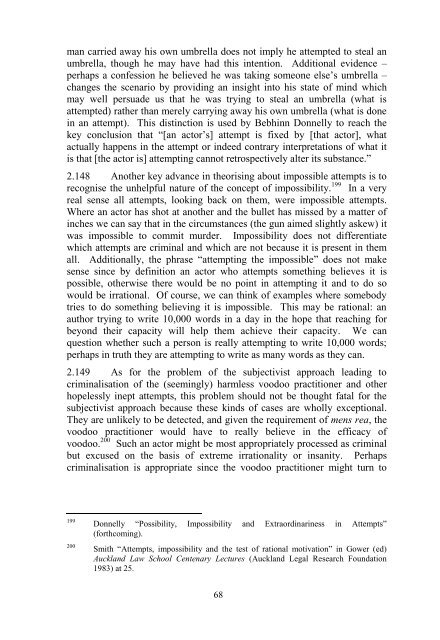Consultation Paper on Inchoate Offences - Law Reform Commission
Consultation Paper on Inchoate Offences - Law Reform Commission
Consultation Paper on Inchoate Offences - Law Reform Commission
Create successful ePaper yourself
Turn your PDF publications into a flip-book with our unique Google optimized e-Paper software.
man carried away his own umbrella does not imply he attempted to steal anumbrella, though he may have had this intenti<strong>on</strong>. Additi<strong>on</strong>al evidence –perhaps a c<strong>on</strong>fessi<strong>on</strong> he believed he was taking some<strong>on</strong>e else‟s umbrella –changes the scenario by providing an insight into his state of mind whichmay well persuade us that he was trying to steal an umbrella (what isattempted) rather than merely carrying away his own umbrella (what is d<strong>on</strong>ein an attempt). This distincti<strong>on</strong> is used by Bebhinn D<strong>on</strong>nelly to reach thekey c<strong>on</strong>clusi<strong>on</strong> that “[an actor‟s] attempt is fixed by [that actor], whatactually happens in the attempt or indeed c<strong>on</strong>trary interpretati<strong>on</strong>s of what itis that [the actor is] attempting cannot retrospectively alter its substance.”2.148 Another key advance in theorising about impossible attempts is torecognise the unhelpful nature of the c<strong>on</strong>cept of impossibility. 199 In a veryreal sense all attempts, looking back <strong>on</strong> them, were impossible attempts.Where an actor has shot at another and the bullet has missed by a matter ofinches we can say that in the circumstances (the gun aimed slightly askew) itwas impossible to commit murder. Impossibility does not differentiatewhich attempts are criminal and which are not because it is present in themall. Additi<strong>on</strong>ally, the phrase “attempting the impossible” does not makesense since by definiti<strong>on</strong> an actor who attempts something believes it ispossible, otherwise there would be no point in attempting it and to do sowould be irrati<strong>on</strong>al. Of course, we can think of examples where somebodytries to do something believing it is impossible. This may be rati<strong>on</strong>al: anauthor trying to write 10,000 words in a day in the hope that reaching forbey<strong>on</strong>d their capacity will help them achieve their capacity. We canquesti<strong>on</strong> whether such a pers<strong>on</strong> is really attempting to write 10,000 words;perhaps in truth they are attempting to write as many words as they can.2.149 As for the problem of the subjectivist approach leading tocriminalisati<strong>on</strong> of the (seemingly) harmless voodoo practiti<strong>on</strong>er and otherhopelessly inept attempts, this problem should not be thought fatal for thesubjectivist approach because these kinds of cases are wholly excepti<strong>on</strong>al.They are unlikely to be detected, and given the requirement of mens rea, thevoodoo practiti<strong>on</strong>er would have to really believe in the efficacy ofvoodoo. 200 Such an actor might be most appropriately processed as criminalbut excused <strong>on</strong> the basis of extreme irrati<strong>on</strong>ality or insanity. Perhapscriminalisati<strong>on</strong> is appropriate since the voodoo practiti<strong>on</strong>er might turn to199200D<strong>on</strong>nelly “Possibility, Impossibility and Extraordinariness in Attempts”(forthcoming).Smith “Attempts, impossibility and the test of rati<strong>on</strong>al motivati<strong>on</strong>” in Gower (ed)Auckland <strong>Law</strong> School Centenary Lectures (Auckland Legal Research Foundati<strong>on</strong>1983) at 25.68
















